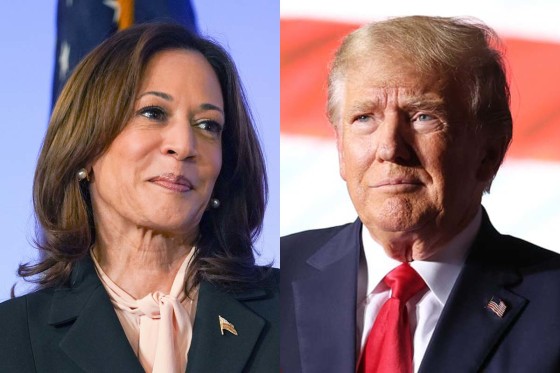Less than two weeks until Election Day, CNBC’s latest national poll finds a margin-of-error presidential contest between Republican Donald Trump and Democrat Kamala Harris both nationally and in key battleground states, with Trump ahead on economic issues and Harris leading on character issues including honesty and the fitness to be president.
In CNBC’s quarterly “All-America Economic Survey,” Trump gets support from 48% of registered voters, while Harris gets 46% — a 2-point spread, well within the poll’s margin of error of plus or minus 3.1 percentage points.
That narrow 2-point lead for Trump is unchanged from CNBC’s August poll, and it’s essentially unchanged from the national NBC News poll earlier this month, conducted by the same pair of bipartisan polling firms, which found the candidates tied at 48% each.
Meanwhile, an oversample of registered voters residing in the seven core battleground states — Arizona, Georgia, Michigan, Nevada, North Carolina, Pennsylvania and Wisconsin — shows Trump ahead of Harris in those combined states by just 1 point, 48% to 47% — again, well inside the margin of error.
The pollsters who conduct the CNBC poll say inflation remains a powerful force shaping this election, with 63% of national voters saying they feel that their family’s income is falling behind the cost of living, and with nearly half of voters calling it one of their top issues for the election — up from previous CNBC surveys.
“Even as the data show inflation has theoretically been slowing down, it has become more important in people’s minds over the course of the last three quarters, not less important,” Democratic pollster Jay Campbell of Hart Research Associates told CNBC. (Campbell conducts the poll with Republican Micah Roberts of Public Opinion Strategies.)
Harris leads on fitness and honesty; Trump is ahead on economic issues
On the issues and presidential qualities, the poll shows Harris leading Trump by 13 points nationally on the question of which candidate has the necessary mental and physical fitness to be president, and she’s ahead by 10 points on being honest and trustworthy.
Trump, however, has a 7-point advantage nationally over Harris on which candidate better strengthens the economy in their communities. Trump also has an 8-point lead on dealing with taxes and businesses and a 9-point edge on the question of helping small businesses.
The poll also finds 42% of registered voters saying they believe they would be better off financially if Trump wins, compared with 24% who believe they would be better off financially if Harris wins. Another 29% of voters say their financial situation won’t change either way.
Asked a different question — which candidate would better bring positive change for the country? — 42% of national registered voters pick Harris, while 40% choose Trump. But both of those numbers are short of what will be needed to win the presidency, and the race may ultimately be decided by two other groups rendering very different verdicts on the question.
Another 5% of voters said they thought both Harris and Trump would bring positive change. And another 9% of voters delivered the pessimistic verdict that neither Harris nor Trump would bring positive change as the next president.
Comparing Trump’s and Harris’ popularity
In addition, the CNBC poll shows Trump slightly more popular than Harris nationally, with Trump’s rating at 42% positive, 48% negative (-6 net rating), while Harris' stood at 39% positive, 49% negative (-10).
But their ratings are almost identical in the battleground states — 44% positive, 49% negative for Trump (-5), compared with Harris’ 43% positive, 48% negative rating (-5).
A GOP edge in the battle for control of Congress
Finally, the poll looks at the battle for control of Congress, with 48% of registered voters preferring Republicans to control Congress, while 44% want Democrats in charge.
That 4-point edge for Republicans is identical in the combined battleground states, 48% for Republicans to 44% for Democrats.
CNBC’s poll was conducted Oct. 15-19 of 1,000 registered voters, which has a margin of error of plus or minus 3.1 percentage points. And the margin of error of the 586 battleground voters from Arizona, Georgia, Michigan, Nevada, North Carolina, Pennsylvania and Wisconsin is plus or minus 4 percentage points.

